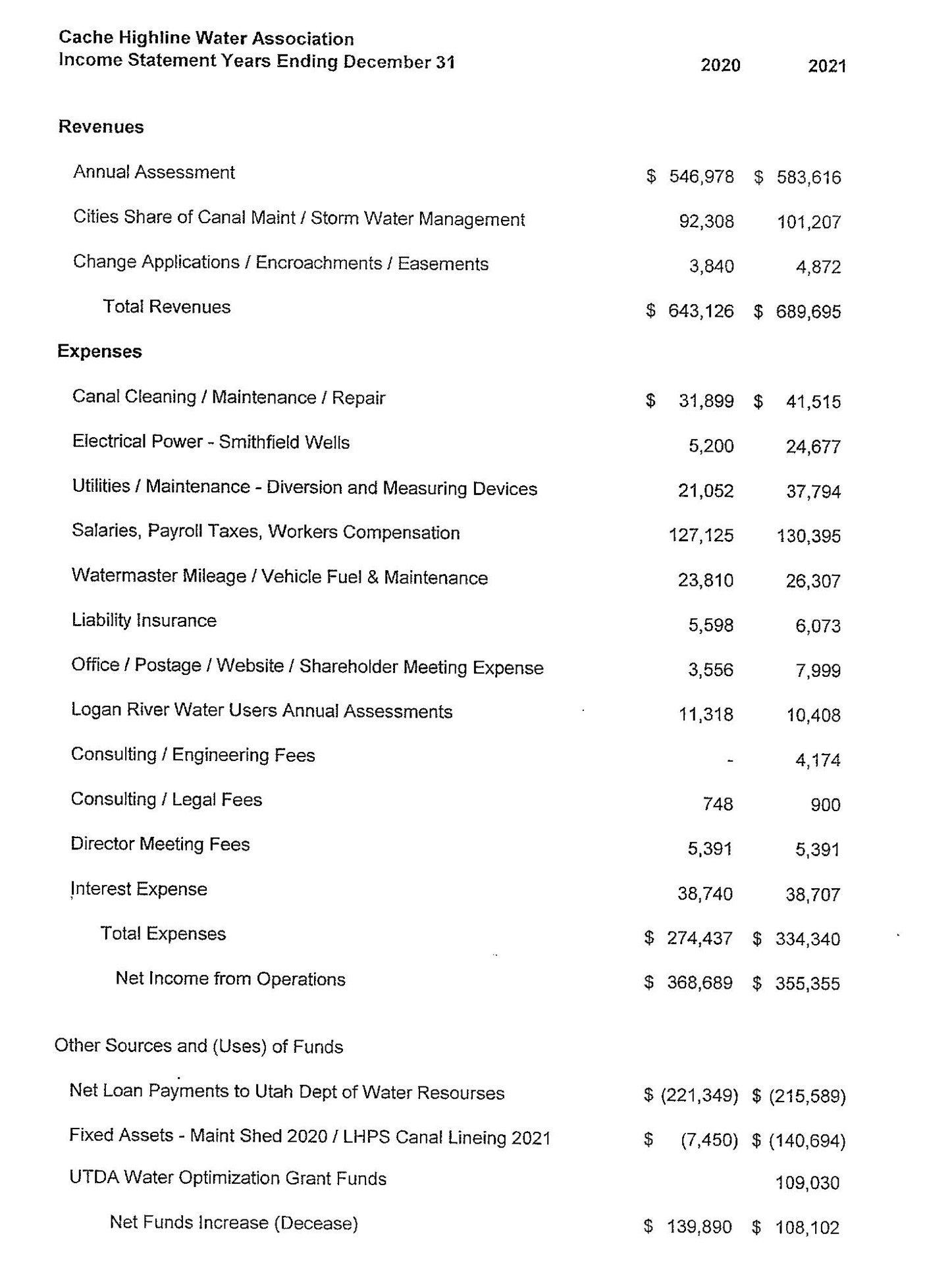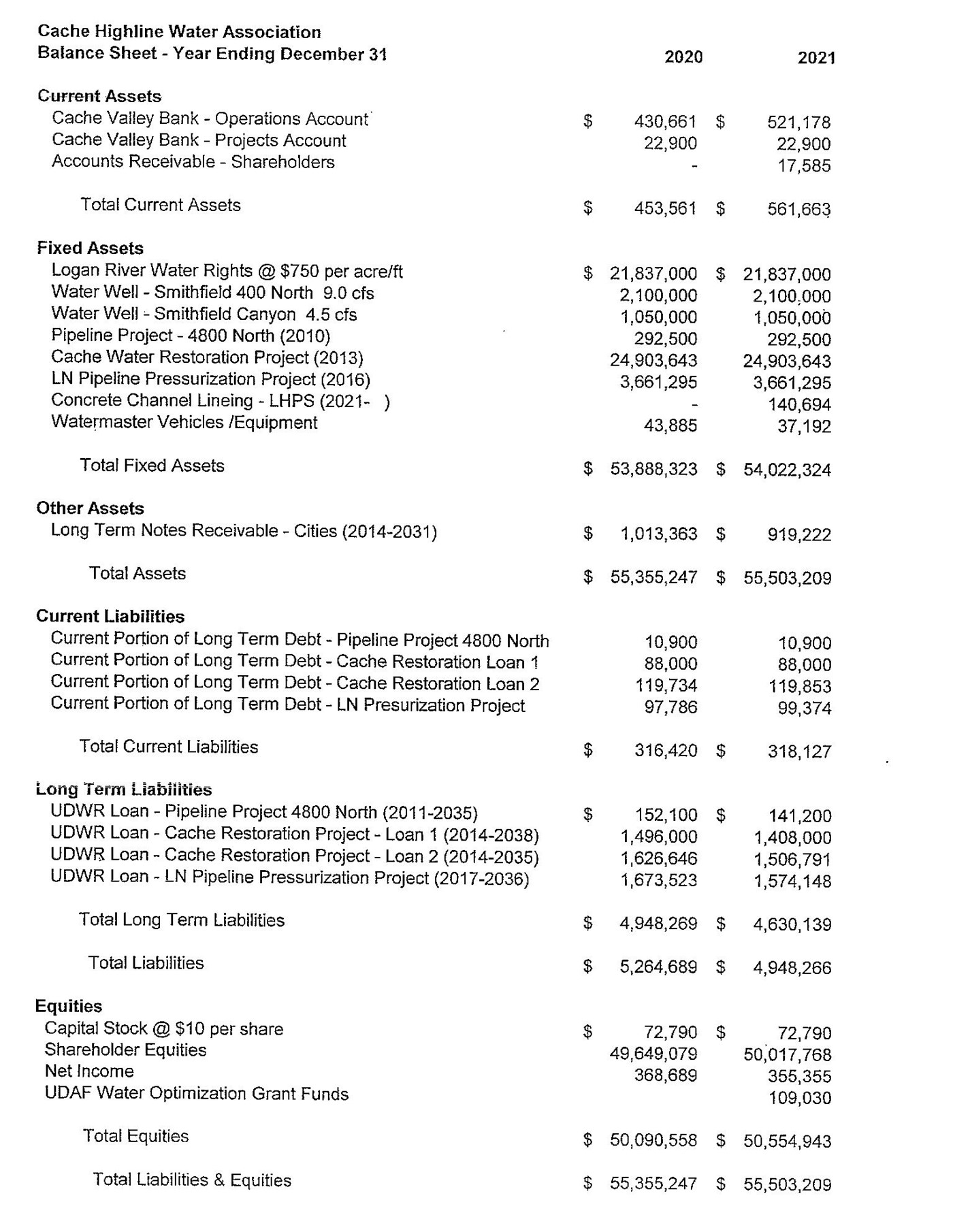The Annual Shareholders’ Meeting
Cache Highline Water Association
April 4, 2022
The Annual Shareholders’ Meeting of the Cache Highline Water Association was held on April 4, 2022, at the North Logan City Library, 475 East 2500 North, North Logan, Utah. Approximately 160 people were present in addition to company officers and employees.
President Jon Wells welcomed the attendees and introduced himself, explaining that as the 2021 Board Vice President, he took over the role of President at the passing of Kirt Hoggan a few months ago.
This is the first annual meeting since 2019 because of the Covid 19 virus. A motion to approve the minutes of the last annual meeting, held on April 1, 2019, was proposed by Carlos Anderson, seconded by Mike Morrill, and carried unanimously.
Financial Report Highlights (see attachments)
Income statement. Treasurer Lyle Thornley presented the comparative 2020 and 2021 financial statements. Logan, North Logan, Hyde Park, and Smithfield all contribute to the CHWA revenues because virtually all of the storm water has been handled and the channel maintained for the cities beginning with the abandonment of the middle canal for secondary water use. He noted revenues were up from the previous year.
Electrical power usage was much higher last year because of the water shortage and the necessity of using the Smithfield wells, which ran nearly all summer. The wells ran enough extra water that Smithfield Irrigation Company paid an extra $11,000 (in addition to CHWA annual dues) and Richfield Irrigation paid $2,000 to CH because those two irrigation companies directly benefitted from the well water. These amounts were subtracted from the total expense to show $24,677 on the Income Statement.
Liability insurance, which increased, is still maintained by the Company. Office expenses also increased because Lyle purchased a four-year supply of invoices and envelopes. Approximately 20 canal companies use Logan River water. CH uses 35-38 percent of the Logan River, making up the Logan River Water Users assessment. Lyle also explained the loan payments and fixed assets.
The result of all revenues and expenses was a net income of $355,255 for the year 2021.
Balance sheet. Since the end of the year, an additional $3,600 of the accounts receivable (shareholders’ annual assessments) has been collected. One large HOA makes up most of the unpaid dues.
Lyle Thornley reviewed the assets and current and long-term debt, including the cities’ contribution to paying down the debt.
Motion to approve. Kim Hawkes made a motion to accept the financial statements as presented; the motion was seconded by Christi Hansen and carried unanimously.
Elections
Three directors’ positions were up for election: Kirt Hoggan, Keith Meikle, and Jon Meikle; both Keith and Jon expressed willingness to serve another term. Lyle opened the floor to nominations.
Keith and Jon Meikle were nominated for three-year terms by Reed Elder and seconded by Mitch Shiffman. JoAnn Nyman was nominated for a three-year term by North Logan City and seconded by Matt Brog (Green Canyon Sprinkling). Reed Elder made a motion that nominations cease; this motion was seconded by Mike Morrill and carried unanimously. All three candidates were elected by acclamation.
Operational Report
Jason Morgado, Water Manager, reported that 2021 was one of the worst years on record, survivable only with the cooperation of everyone on the system. This year is not looking better, with only 82 percent of the normal snowpack in the canyon. Currently the Logan River is running at 127 cfs; the hope is for a slow snow melt this spring. Water will be turned into the channel around April 18. Jason will be contacting all headgate managers as the season begins to discuss how the water will be distributed. There are no changes; however, there were some misunderstandings about how the water right works: the water right is variable and fluctuates with the flow of Logan River.
New state regulations are going to require some changes. Shalaine DeBernardi, Project Funding Manager for the Division of Water Resources, explained the requirements of House Bill 242, entitled Secondary Water Metering Amendment, the opportunities for funding, and the implication for all headgates/headgate managers. This new law requires meters on every connection of a pressurized secondary system (i.e., every irrigation company) by 2030. Agriculture land is exempt from this bill. The Legislature has provided $250 million in grant funds to the State Division of Water Resources to award up to 70 percent of the cost per applicant (with some caps depending on the number of connections); “free” money will available until 2026. Monies will be paid to the applicant/irrigation company, not the company completing the work. The first application window is open until May 15; details, criteria, and procedures are listed on the DWR website; information is also available on the CHWA website.
This meeting adjourned at 8 p.m.


